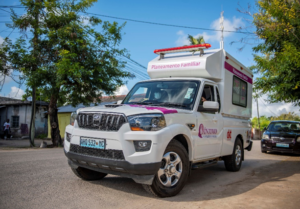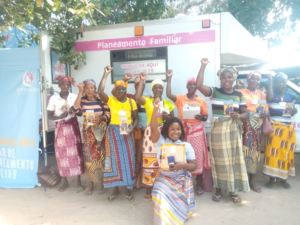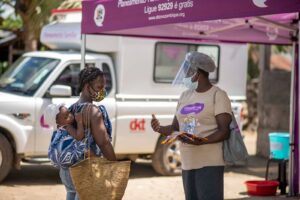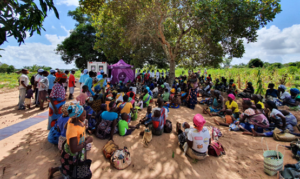Community activist Aruquia Paulino Amadi starts her 2-hour commute to work each day at 6:00 AM, driving to the most remote areas of the Nampula province in Northern Mozambique in the back of an ambulance. Amadi will spend the next eight hours under the sun providing essential sexual and reproductive health (SRH) information to the conflict-affected community from one of DKT Mozambique’s mobile clinics.
DKT Mozambique operates 13 mobile clinics – ambulances constructed with portable consultation tents that provide IUD andimplant insertions and provide free, last-mile outreach services to the most underserved communities of the country. Amadi serves upwards of 80 women and girls a day, many of which will also leave with a free, contraceptive method of their choice. The rights-based family planning (FP) counseling, and confidential clinics access 236 service points around the country reaching women and girls who would otherwise go without access to any SRH information or services.

”I help women, girls, and couples, as well as community leaders, to understand the importance of family planning, to make choices and spacing between children, to know about their reproductive rights,” Amadi explains.
In 2023 alone, DKT’s 13 mobile clinics in Mozambique reached over 340,000 people with SRH information and provided 153,727 women and girls with free contraceptives. For 24% of those reached, the experience with the mobile clinic was their first time ever receiving this type of SRH service.
Amadi knows that her work is incredibly important and she is proud to work alongside 88 other DKT mobile clinic staff. Women and girls in Mozambique face inconsistent access to quality sexual and reproductive health (SRH) care and information, severely impacting their lives. Barriers to care include a lack of trained capable staff, limited necessary medical equipment, ubiquitous supplies stockouts, and long waiting times and distances (e.g., approximately 12 km or three hours walking on average to arrive at the nearest health post) for those seeking SRH services, information, and products. Many women and girls are unable to realize their reproductive rights in a country where the rates of maternal mortality (127 per 100,000 live births) and HIV/AIDS (12.6%) are unacceptably high.

Activist Amadi posing with patients she supported with comprehensive SRH information and referred to at the mobile clinic for free contraceptive counseling.
The communities Amadi serves in Nampula live far away from health facilities, and thus, often cannot access a public clinic with SRH services. Without the mobile clinic, she says, many women and girls would be pregnant without wanting to be and would run into complications such as premature marriage due to that early pregnancy. A lack of SRH services also contributes to declining maternal health outcomes and an increased risk of contracting HIV/AIDS and sexually transmitted diseases.
Adolescent girls and young women are especially impacted by gaps in SRH services and the stigmatization in seeking such services. Nationally, 29% of girls (aged 15 to 19) already have a child. Approximately 15% of children drop out of primary education, and according to a nationwide assessment conducted by UNICEF, SRH-related factors have the highest association with dropout.
DKT’s mobile clinics also routinely navigate active conflict zones within Mozambique. For the past seven years, there has been violent armed conflict in the Cabo Delgado province. Over 1 million people have been forcibly displaced (many more than once), severely disrupting their livelihoods and access to essential health services, including SRH care. The conflict has made the mobile clinic job more difficult and dangerous, but Falume Abdala, DKT Mozambique’s Regional Representative in Cabo Delgado, affirms the mobile clinic staff always take the necessary precautions and remain committed to serving the women and families who seek services despite concerns over their personal safety in a conflict plagued by its unpredictability. Abdala says the mobile clinic offers hope and reminds affected communities they are not forgotten in times of crisis. “Discontinuing the mobile clinic services would mean denying access to this care,” Abdala said.

An activist presents a woman in rural Mozambique with all her contraceptive options (oral contraceptives, condoms, injections, IUDs, and more), which, if she chooses to, she can immediately access at the mobile clinic.
DKT’s clinics are operational because they work alongside the Ministry of Health (MISAU), with generous support from the Swedish International Development Cooperation Agency (Sida), UNFPA Mozambique, and the Erik. E. and Edith H. Bergstrom Foundation, filling a critical gap through last-mile delivery to those beyond the reach of the traditional public health system. These free services also help to alleviate strain on already overwhelmed public clinics. The clinics cover nine out of 11 provinces, visiting a total of 44 districts each month.
DKT’s activists and nurses often supply more than just products and services. Amadi said they are also often forced to contend with lots of misinformation and deep-seated myths taught to women and girls about their reproductive health. For young people, many of which receive minimal sexual education at school or at home, the mobile clinics offer a valuable source of neutral, evidence-based SRH information outside the purview of their parents and peers’ potentially misinformed beliefs. Most importantly, the mobile clinics allow women and girls to take their reproductive destiny into their own hands by removing economic and social barriers to contraceptive access, bringing free services to meet them where they are.
Amadi noted that men and boys are also often left out of the conversation altogether. If men are also not educated about reproductive health, women and girls suffer.
“There are many myths that are widely spread and believed within the community, such as: family planning is only for women who have more than five children,” she said.

Women in rural Mozambique wait to access the mobile clinic services which extends beyond the traditional facility-based services to bring SRH care to them, even in the most hard-to-reach areas.
DKT’s Mobile Clinics provide a youth-friendly, non-judgemental space for communities to have their SRH-related questions answered and individual needs met through activist-led discussions, safe sex community talks, and one-on-one private consultations. To ensure continued care, DKT works closely with community leaders and provincial health officials to inform the community of the clinic’s schedule, allowing women, couples, and youth to better plan their visits according to their schedules.
DKT continues to appreciate the essential work done by our mobile clinic staff, and the funding partners that help make this work possible. More than ever, the DKT Mozambique team remains committed to reproductive justice: to safeguarding and upholding the right for all women and girls to have the complete economic, social, and political power and resources to make healthy decisions about their bodies, their families, and their communities in all areas of their lives.
